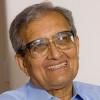Amartya Sen is Thomas W. Lamont University Professor, and Professor of Economics and Philosophy, at Harvard University and was until recently the Master of Trinity College, Cambridge. He has served as President of the Econometric Society, the Indian Economic Association, the American Economic Association and the International Economic Association. He was formerly Honorary President of OXFAM and is now its Honorary Advisor.
Amartya Sen’s books have been translated into more than thirty languages, and include Choice of Techniques (1960), Collective Choice and Social Welfare (1970), On Economic Inequality (1973, 1997), Poverty and Famines (1981), Choice, Welfare and Measurement (1982), Resources, Values and Development (1984), On Ethics and Economics (1987), The Standard of Living (1987), Inequality Reexamined (1992), Development as Freedom (1999), Rationality and Freedom (2002), The Argumentative Indian (2005), Identity and Violence: The Illusion of Destiny (2006) and The Idea of Justice (2009).
Among the awards he has received are the “Bharat Ratna” (the highest honour awarded by the President of India); the Senator Giovanni Agnelli International Prize in Ethics; the Alan Shawn Feinstein World Hunger Award; the Edinburgh Medal; the Brazilian Ordem do Merito Cientifico (Grã-Cruz); the Presidency of the Italian Republic Medal; the Eisenhower Medal; Honorary Companion of Honour (U.K.); The George E. Marshall Award, and the Nobel Prize in Economics.
